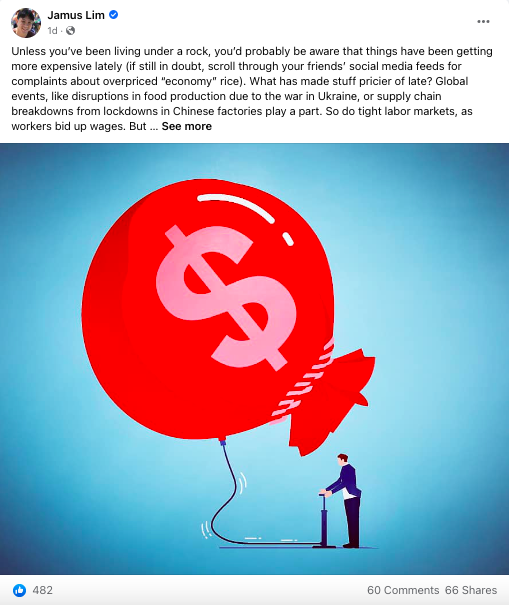In a Facebook post on July 10, Workers’ Party MP Jamus Lim proposed a solution that would help people on a fixed income who are affected the most by today’s high inflation rates.
“It seems fair for the government to make up for higher inflation faced, with temporarily higher CPF rates,” he wrote.
The Sengkang GRC MP explained that today’s higher prices are due to global events such as disruptions in food production because of Russia’s attack on Ukraine, supply chain breakdowns due to lockdowns in China, as well as tight labour markets.
But he added that inflation would not be such a big deal as long as wages keep up with the increase in prices.
“Usually, labor markets are pretty good about doing so (especially when you kaopeh your boss for a raise because, well, inflation), after some time. Financial markets do a decent job too, as long as they’re allowed time to work,” he added.
But the MP, who is an Associate Professor in Economics at ESSEC Business School acknowledged that inflation is the toughest on those who have a fixed income.
“Without an adjustment, the real savings of retirees or assistance received for those on financial aid will permanently buy less than before. These folks need help now.”
He then proceeded to explain a possible solution.

“Thankfully, such an adjustment exists: it’s called the interest rate. Higher interest rates pass along the somewhat artificial price increases to you and I, and ensures that, if you’re a saver, you don’t inadvertently lose purchasing power.
Problem is, CPF rates—which are tied to local banks’ interest rates—haven’t adjusted upward. But in the meantime, costs are rising. It seems fair for the government to make up for higher inflation faced, with temporarily higher CPF rates.”
And while he wrote that such a move would be pricey in the short run, he also argued that “governments aren’t supposed to be saving money because they end up paying a reduced interest bill due to inflation. That would amount to a stealth tax.
Rather, they should increase CPF interest payouts to keep accountholders whole, at least temporarily. And when financial markets eventually price in this inflation premium into government debt, this will automatically be reflected in their (higher) borrowing costs.”
Furthermore, he added that such a scheme would be to everyone’s advantage.
“So as long as you’re a saver, you’ll benefit from higher returns, regardless of your wealth.
But for almost all of these folks, the higher rate will simply be an adjustment to the fact that everything has risen in price.
Put another way, this move seeks to restore everyone’s purchasing power, to what it was before the inflation surge.”
Assoc Prof Lim later added the following postscript”
The magic of this proposal is that it need not entail much fiscal outlay at all. Higher CPF rates can be funded by higher rates paid by Special Singapore Government Securities (SSGS), which is how the government pays CPF.
Then, if our sovereign wealth funds are doing their job, they would be investing in foreign bonds, which have been faster in pricing in this inflation premium.
They also invest for the long run, where returns will likewise do the same. They should earn back what they are giving out now. Even locking in HDB loan rates for borrowers could entail minimal costs.
The government just needs to issue all required debt for the future now, at current rates. They won’t be making money, but they shouldn’t, when things are so difficult for the people now.
/TISG
Jamus Lim: Resident shares concerns over migrant professionals crowding out locals – Singapore News
Resident talks to Jamus Lim about challenges singles face in Singapore

